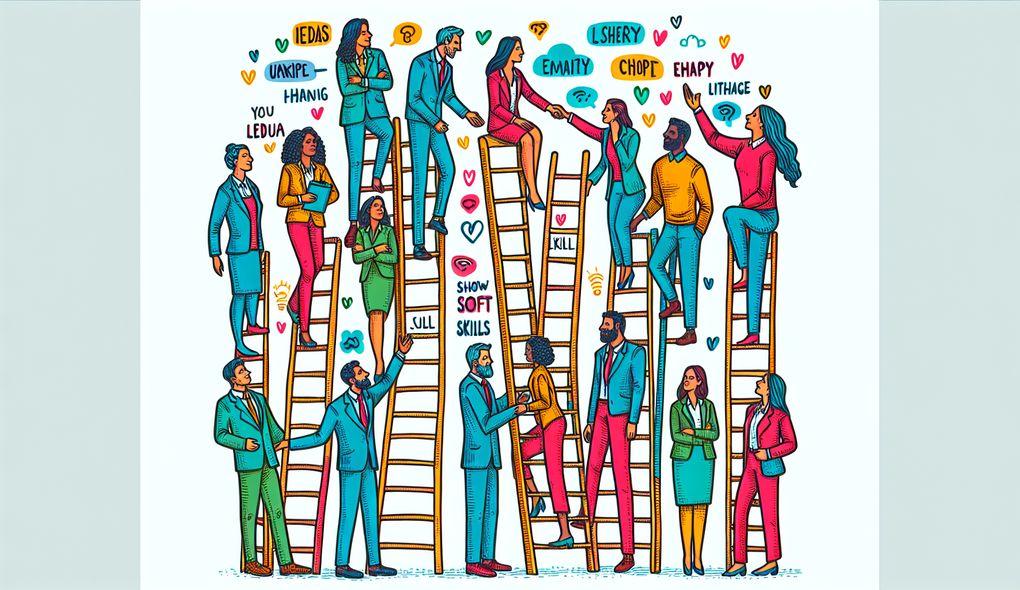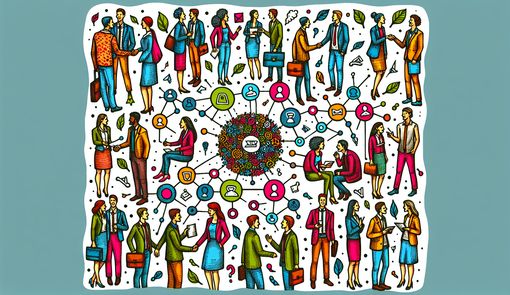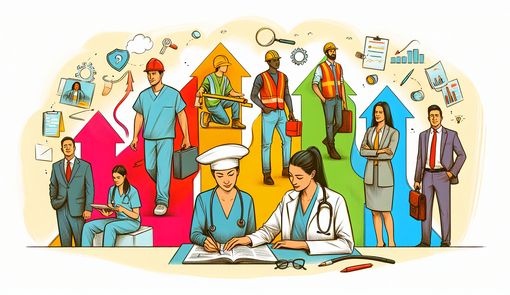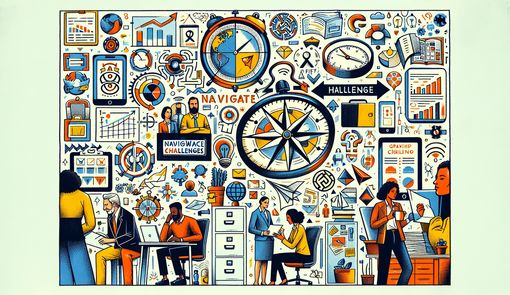The Importance of Soft Skills in Climbing the Corporate Ladder
Discover how soft skills can significantly impact your career advancement within the corporate world.

In the modern workplace, climbing the corporate ladder requires more than just technical know-how or a stellar resume; it demands a robust set of soft skills that often determine the potential for career advancement. As you set your sights on upper management or executive positions, understanding and developing these skills can make a significant difference in your professional trajectory.
The Definition and Value of Soft Skills
Soft skills, unlike hard skills that are measurable and can be gained through education and training, are personal attributes that enable someone to interact effectively and harmoniously with others. These include communication, problem-solving, teamwork, leadership, and adaptability. In a corporate environment, they are invaluable as they not only determine how well you perform your job but also how you are perceived by colleagues and superiors.
Communication: The Cornerstone of Corporate Success
Effective communication is paramount in the corporate world. It involves clearly conveying ideas, actively listening to others, understanding nonverbal cues, and being able to read and compose written documentation. Good communicators can navigate complex corporate structures, advocate for themselves and their teams, and build valuable relationships across the organization.
Leadership: More Than Just Being in Charge
Leadership is about motivating and guiding others towards a common goal. It's the ability to inspire trust, delegate tasks appropriately, and make strategic decisions that further the company's objectives. Those with strong leadership skills are often earmarked for promotion because they can handle responsibility and drive results.
Teamwork: United We Stand
Another critical component of the corporate world is the concept of teamwork. Being able to work effectively as part of a team demonstrates your ability to collaborate, respect diverse opinions, and contribute to a shared objective. Companies value employees who can blend into various teams and projects and who help foster a cohesive working environment.
Problem-Solving: Navigating Challenges with Grace
The ability to identify issues and implement solutions is an indispensable skill. Problem-solving involves critical thinking, creativity, and resilience. Moreover, it requires the willingness to take calculated risks and the ability to learn from failures, both of which are highly regarded qualities in the corporate setting.
Adaptability: Embracing Change
In a world where industries and technologies are ever-changing, adaptability is a must-have soft skill. Being able to adjust to new situations, learn quickly, and remain flexible when faced with uncertainty can set you apart from others who may struggle with change.
Cultivating Soft Skills for Career Advancement
While soft skills may be inherent for some people, they can also be developed and honed over time. Active participation in team projects, seeking leadership roles, embracing opportunities for public speaking, and engaging in continuous learning are all ways to enhance these skills.
Boosting Your Soft Skill Set
Personal development workshops, mentorship programs, and even online courses can provide avenues to strengthen your soft skills. Reflecting on feedback, setting personal goals for improvement, and observing industry leaders can also give insights into which soft skills are most crucial in your field.
The Intersection of Soft and Hard Skills
It's essential to recognize that while soft skills are crucial for career advancement, they are most effective when combined with a strong set of hard skills. The intersection of these skill sets enables you to apply technical expertise with interpersonal effectiveness, positioning you as a well-rounded and competent leader.
Assessing and Showcasing Your Soft Skills
Assessment tools and self-reflection can help identify your soft skill strengths and areas for improvement. Once honed, it's important to showcase these skills in your resume, cover letter, and during interviews. Concrete examples of how you've used soft skills to achieve results can be very persuasive to potential employers.
The Role of Company Culture
The culture of an organization plays a significant role in which soft skills are most valued. It's important to understand the cultural dynamics of a company and which soft skills align with its values to increase your chances of success within that organization.
The Impact of Soft Skills on Career Longevity
Beyond ascending the corporate ladder, soft skills contribute to career longevity. They help you navigate workplace dynamics, build lasting relationships, and maintain relevance in a changing job market. They are, in many ways, the foundation upon which a long and successful career is built.
Conclusion
As you evaluate your career development plan, prioritize the cultivation of soft skills. Their impact on your ability to climb the corporate ladder is clear. They fuel collaboration, leadership, adaptability, and problem-solving abilities, which are all prized by employers. With deliberate effort and continuous improvement, your soft skills will enhance your professional growth and lead you to greater career heights.
Frequently Asked Questions
1. What are soft skills, and why are they important in climbing the corporate ladder?
Soft skills are personal attributes that enable effective interaction with others. They are crucial in corporate advancement as they influence how well you work and are perceived by colleagues and superiors.
2. How can I develop my soft skills?
Soft skills can be developed through active participation in team projects, seeking leadership roles, engaging in public speaking opportunities, and continuous learning. Additionally, personal development workshops and mentorship programs are beneficial in honing these skills.
3. Are soft skills more important than hard skills in career advancement?
While both soft and hard skills are essential, soft skills are often seen as a determining factor in career advancement. They complement technical expertise and contribute significantly to leadership effectiveness and overall success in the workplace.
4. How can I assess my soft skills?
Assessment tools and self-reflection can help you identify your soft skill strengths and areas for improvement. Seeking feedback from colleagues and mentors can also provide valuable insights into your soft skill proficiency.
5. How should I showcase my soft skills during the job application process?
To showcase your soft skills effectively, incorporate concrete examples in your resume and cover letter that demonstrate how you have utilized these skills to achieve results. Be prepared to discuss specific instances during interviews to highlight your proficiency.
Further Resources
For further exploration of the importance and development of soft skills in the corporate world, here are some valuable resources:
- LinkedIn Learning: Access a wide range of online courses on soft skills such as communication, leadership, and teamwork.
- Harvard Business Review: Explore articles and publications on soft skills, leadership, and career advancement strategies.
- TED Talks: Watch inspiring talks on communication, problem-solving, and adaptability presented by industry experts.
- Coursera: Enroll in courses on emotional intelligence, conflict resolution, and decision-making to enhance your soft skills proficiency.
- MindTools: Discover practical resources and tools for developing essential soft skills required in the corporate environment.
- Books: Consider reading bestselling titles like "Emotional Intelligence 2.0" by Travis Bradberry and Jean Greaves or "The 7 Habits of Highly Effective People" by Stephen R. Covey for in-depth insights.
- Workshops and Seminars: Attend local workshops or seminars focused on communication, leadership, and other soft skills to interact with experts and peers.
- Career Development Websites: Explore websites like The Muse, Glassdoor, and Indeed for articles, tips, and resources on enhancing your soft skills for career progression.
By leveraging these resources, you can deepen your understanding of soft skills and take proactive steps towards honing these essential abilities for professional success.

 Resume and Cover Letter Writing
Resume and Cover Letter Writing Interview Preparation
Interview Preparation Career Development
Career Development Networking and Personal Branding
Networking and Personal Branding Workplace Skills
Workplace Skills Job Search Strategies
Job Search Strategies Work-Life Balance
Work-Life Balance Salary Negotiation
Salary Negotiation Career Transitions
Career Transitions Navigating Workplace Challenges
Navigating Workplace Challenges Professional Growth
Professional Growth Trends in the Workplace
Trends in the Workplace